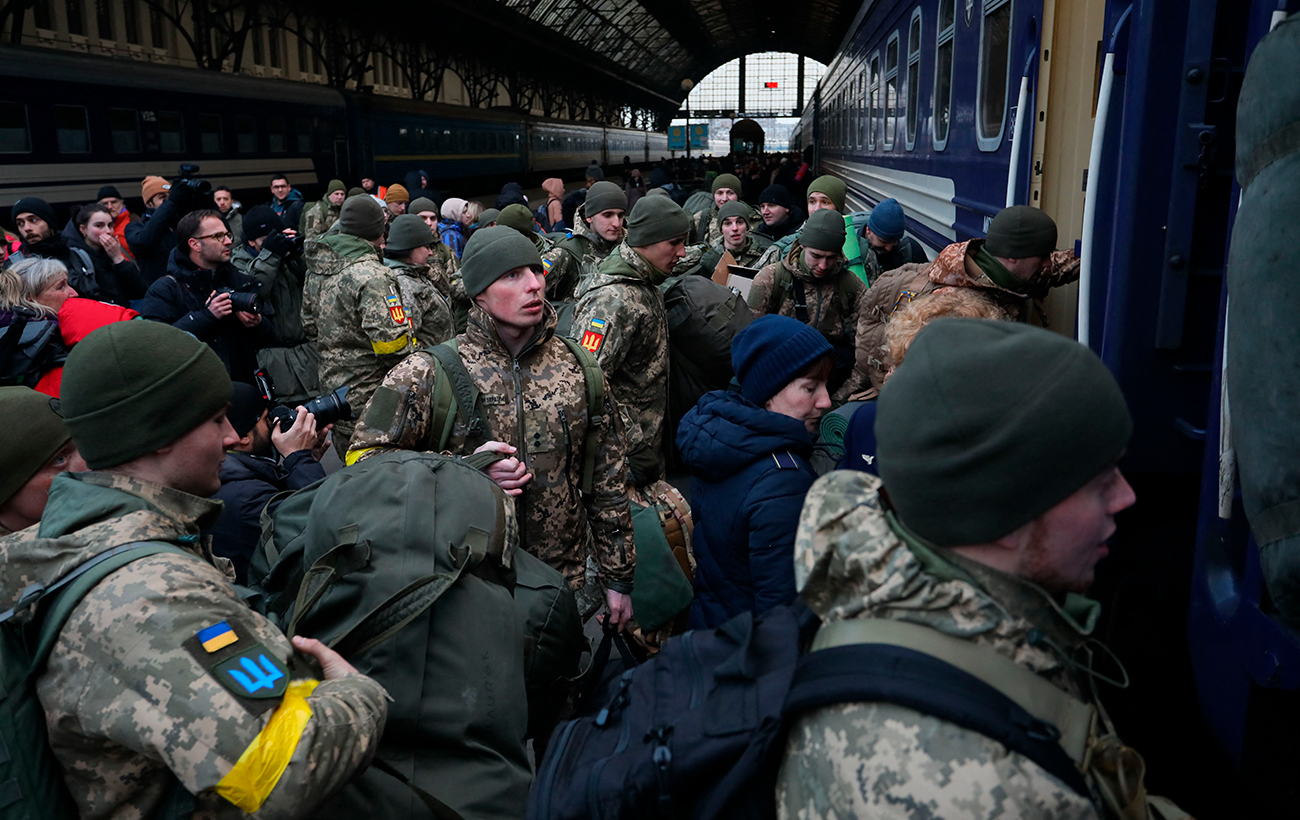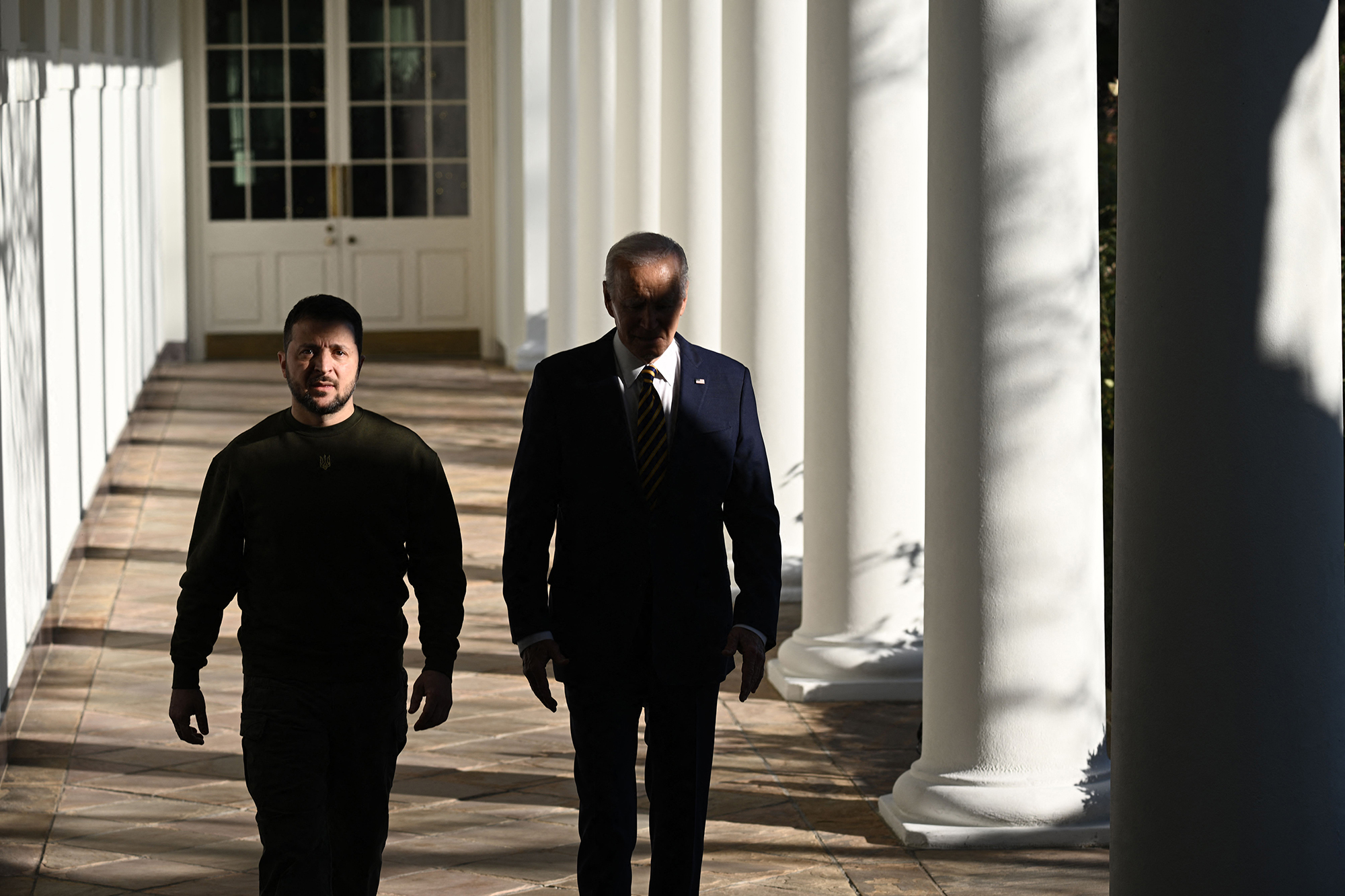USA pressing, Ukraine opposing: Will mobilization age be lowered to 18 and whether it makes sense
 Volodymyr Zelenskyy and Joe Biden (photo: Getty Images)
Volodymyr Zelenskyy and Joe Biden (photo: Getty Images)
For several months, the topic of lowering the mobilization age in Ukraine has been actively discussed in the public space. Recently, the dialog between Washington and Kyiv has become public. RBC-Ukraine explains why the United States is pushing this issue and what Ukraine thinks about it.
Russia's full-scale invasion of Ukraine has been going on for almost three years now. During this time, Russia, according to official statements, has lost about 650,000 soldiers killed and wounded. In Ukraine, 43,000 soldiers have been killed at the front and about 370,000 wounded, as President Volodymyr Zelenskyy announced in early December.
At the end of the third year, hostilities became more intense as Russia broke through the front line, seeking to capture as much Ukrainian territory as possible. According to reports from the Ukrainian General Staff, the Russian army is losing about 1,000 soldiers every day, but the Kremlin does not seem to be deterred. Moscow is using the long-standing method of meat assaults, regardless of losses.
It is difficult for Ukraine - Kyiv does not want to resort to the same method, seeking to wage war according to modern standards, as far as possible, i.e., to fight with equipment, not people. To do this, the military needs a large number of weapons, which the Ukrainian government is constantly asking its Western partners for. In addition, the slow pace of mobilization is affecting the military - there are not enough soldiers, and those who are at the front complain that rotations are extremely rare and there is no one to replace them.
The Western allies, while supplying the Ukrainian army with moderate arms packages, are still gently raising the topic of negotiations, compromises, and security guarantees. At the same time, Western officials have recently begun to gently push Kyiv to lower the age of mobilization from 25 to 18.
So far, these statements sound like suggestions, and the partners assure that the final decision is up to Ukraine. But RBС-Ukraine's interlocutors are confident that lowering the mobilization age may soon become a requirement in exchange for significant aid.
US' pressure and Kyiv's response
The next wave of mobilization has been in crisis since the summer of 2023. Queues at military recruitment offices ran out and it suddenly became clear that the Territorial Recruitment Centers simply did not have up-to-date data on millions of people liable for military service. And many were in no hurry to update their information. Raids in cities yielded results, but minimal ones. In addition, the general attitude towards mobilization was affected by various scandals - aggressive behavior of the Territorial Recruitment Centers and corruption in military enlistment offices.
The latter led to Zelenskyy's decision to dismiss all the regional heads of the Territorial Recruitment Centers at once, which was also not perceived unambiguously and affected the pace of mobilization. The former Commander-in-Chief of the Armed Forces of Ukraine, Valerii Zaluzhnyi, spoke about this much later, saying that the former military commissars were professionals.
Difficulties with recruiting people into the army led to criticism from the military, who complained about the quality of the recruits. Later, the topic of mobilization became so toxic in the media that neither the General Staff nor the government wanted to be associated with it, refusing to comment on it.
At the same time, the situation at the front was deteriorating. The Ukrainian counteroffensive, expectations of which had been overblown, failed. On the other hand, the Russians relied on human resources, which they could afford to spend on a terrible scale. In Ukraine, mobilization continues, but the result is still clearly not what the military command would like. In April 2024, the Verkhovna Rada lowered the conscription age from 27 to 25 to increase the number of potential recruits.
For the first time, Serhii Leshchenko, an adviser to the head of the Presidential Office, said in October that Western partners were proposing that Kyiv lower the mobilization age from 25 to 18. According to him, this topic is being pushed by the United States, both Democrats and Republicans. Their main argument was that during the Vietnam War, Americans were recruited into the army from the age of 19.
 Ukrainian soldiers at a train station in Kyiv (photo: Getty Images)
Ukrainian soldiers at a train station in Kyiv (photo: Getty Images)
A few days later, Ukrainian Defense Minister Rustem Umerov commented on the issue. He confirmed that the allies were raising the issue of lowering the mobilization age, but assured that the Ukrainian government would not adopt this decision.
“We always want to give people a choice. Now, as we say, we are working following all the norms of the law. The legislation clearly states that it is from the age of 25 and above. If someone has a desire to come and serve, we are always happy,” Umerov said at a briefing on October 18.
On the same day, Zelenskyy said that the government had no plans to lower the mobilization age and that those who want to join the Armed Forces under the age of 25 can sign a contract with the Defense Ministry.
This is not to say that society, the military, and politicians are divided into two camps. On the contrary, there are many more opponents of lowering the mobilization age than those who support this idea. Among the latter is MP and current military officer Roman Kostenko, who in his comments to the media said that the army lacks young people. Bloomberg reported that the average age of the Ukrainian military is about 40 years old.
Among those servicemen who are willing to comment on this topic, Kostenko's opinion is the only one. For the most part, the military is against lowering the age, arguing that 18-year-olds may not be ready for the front. For example, Olena Ryzh, a soldier with the 47th separate mechanized brigade, believes that few people aged 18 can handle what happens on the battlefield.
“There are people among my comrades who are 19-20 years old, yes. But we are all very different in terms of our inner world, upbringing, and character. Some are internally and psychologically ready, while others are not yet ready for this. And to simply fill our army with children because some of our foreign partners wanted to do so is unacceptable to me. In my opinion, it will not be effective,” says Olena Ryzh in a commentary to RBC-Ukraine.
Artem Chapai, a soldier of the Armed Forces of Ukraine, spoke in the same vein on this topic. According to him, 18-year-olds are not ready for war, and no matter how much he wants it to end, the draft age should not be lowered.
“Males under 25 are late adolescents, their inhibitory centers have not yet developed. They have not yet lived. Mobilization from the age of 18 in previous wars was a crime. These are children, no matter what they think of themselves. The most absurd thing is noticeable in the United States when you can't legally drink until you're 21, but you could be taken to war,” Chapai wrote on Facebook.
In November, the topic of lowering the mobilization age arose again. This time, the Associated Press reported, citing a US official, that Joe Biden's administration was once again calling on Kyiv to lower the draft age. Allegedly, this is required by the current situation at the front. In addition, American allies have hinted that Biden's time in the White House is running out, so if Ukraine quickly lowers the mobilization age, the current president's administration will have time to allocate more funds.
 Volodymyr Zelenskyy and Joe Biden at the White House (photo: Getty Images)
Volodymyr Zelenskyy and Joe Biden at the White House (photo: Getty Images)
The agency notes that time is running out, the Biden administration emphasizes that Ukraine has the necessary weapons, and now it must quickly increase the number of its troops if it is going to continue the fight against Russia.
Zelenskyy reacted to this again. On November 19, during the presentation of the resilience plan in the Verkhovna Rada, he again said that no one was going to lower the mobilization age. However, those under the age of 25 would be offered motivational packages if they signed a contract with the Defense Ministry.
In early December, the Washington Post touched upon the issue of lowering the mobilization age, noting that the Biden administration was disappointed with mobilization in Ukraine. The article said that the United States was holding emergency talks with Kyiv to allocate funds, but at the same time expected Zelenskyy to lower the draft age. On December 4, US Secretary of State Antony Blinken indirectly commented on the topic, essentially confirming that discussions on this issue were indeed underway. During a regular briefing, he said that Ukraine had to make difficult but necessary decisions regarding mobilization.
On December 10, the United States openly stated that it was ready to equip the newly arrived troops if Kyiv mobilized them. US State Department spokesperson Matthew Miller said during a briefing that if Ukraine provides additional forces to fight, the US and its allies will be ready to equip and train those forces.
The Ukrainian side continued to fight back. Zelenskyy said that Kyiv would not compensate for the lack of weapons with the youth of the soldiers. A week after Miller's statement, it seems that for the first time in Ukraine, the phrase that the United States is absolving itself of responsibility by proposing to lower the mobilization age was publicly voiced. This was stated by Deputy Prime Minister for European Integration Olha Stefanishyna, who added that the issue of equipping soldiers cannot be raised in this way, as they should be provided with equipment under the agreements.
“I perceive this (statements by Western officials about the need to lower the age of mobilization in Ukraine - ed.) as a desire to remove responsibility for the agreements that were made earlier,” the official said.
.jpg) Antony Blinken (photo: Vitalii Nosach/RBC-Ukraine)
Antony Blinken (photo: Vitalii Nosach/RBC-Ukraine)
The fact that the United States has already come out with this statement head-on at least indicates that this issue has been discussed on the sidelines for a long time. Internal discussions, as well as leaks to the local press, proved fruitless, so the US decided to go public with this issue. Although some Ukrainian officials deny the very fact of pressure from their American friends. For example, MP Oleksandr Zavitnevych told RBC-Ukraine that the United States is interested in this issue, but does not set any ultimatums. In addition, he said, the idea of lowering the mobilization age has never determined the nature of negotiations with Washington.
“Under any circumstances, manning the Ukrainian Defense Forces with the required number of mobilized persons should be considered not only in the context of lowering the mobilization age. First of all, the reserves should be sought to improve the system of incentives for the contract form of joining the army, improving the recruitment campaign both at the level of the Ministry of Defense, General Staff, and the units themselves, and the conditions of military service,” Zavitnevych said.
Trump's plans: Will new US leader put pressure on Kyiv?
The latest statement on this issue, as of December 18, came from Zelenskyy again. In a commentary to Le Parisien, he said that there are signals from the allies about lowering the mobilization age, which are discussed both publicly and behind the scenes. In both cases, according to the president, the Ukrainian side responds to its partners that it is not fair to talk about it.
“I believe that today it is not an honest conversation. I said this publicly and not publicly to the leaders. It's just not fair. Modern warfare is different. Without the cover of the sky, how can you storm and move forward? And the leaders know this. And that's why these are, you know, such political games,” Zelenskyy added.
The discussion about Ukraine's need to lower the mobilization age has been going on for several months. Judging by the fact that it has entered the public space, where both sides openly state their positions, the internal dialogue is likely to be even tougher - the United States is apparently not only interested in whether we can do this but is also gently pushing this issue.
Moreover, RBC-Ukraine's interlocutors among Ukrainian and foreign political representatives do not deny that the newly elected US President Donald Trump may take the baton from Biden on this topic. And he, in his typical manner, will likely put even more pressure on Kyiv than the current administration.
 Volodymyr Zelenskyy and Donald Trump (photo: Getty Images)
Volodymyr Zelenskyy and Donald Trump (photo: Getty Images)
Trump has repeatedly said that the responsibility for helping Ukraine in the war against Russia should be borne primarily by Europe, not the United States. At the same time, the team of the newly elected American president has been imposing on its electorate the idea that Ukraine has lost this war, suffering huge destruction and large-scale human losses.
According to RBC-Ukraine's interlocutors, if Trump fails to bring both sides to the negotiating table, which is unlikely today, the United States will continue to help with weapons and money. But in his voter's picture, Ukraine is losing, and it simply doesn't make sense to continue supplying it with weapons.
“The idea here is quite simple: Kyiv lowers the mobilization age, everyone goes to war, and Trump shows this to his electorate. Like, look, they are ready to fight against the aggressor as a nation, sacrificing everything. Let's help them!” says one of the interlocutors of RBC-Ukraine.
In this case, the United States commits itself to provide Kyiv with substantial military assistance, and Ukraine must show that it is ready to go to extreme lengths and send boys who have barely reached the age of majority to the front. Lowering the mobilization age may likely become one of the demands to the Ukrainian authorities in internal negotiations in a package with the possible holding of elections, tax increases, etc.
Ukrainian sources, speaking on condition of anonymity, say that the government will fight off these demands to the last. “We are categorically against it. It will be very bad politically, economically, demographically, from all sides,” a high-ranking government source said.
In personal conversations, they add that the failure of mobilization played a significant role in the emergence of this topic. If recruitment had been more effective, and if scandals about corruption and aggression on the part of the Territorial Recruitment Centers had not been layered on top of each other every week, there might not have been so much talk about lowering the draft age.

